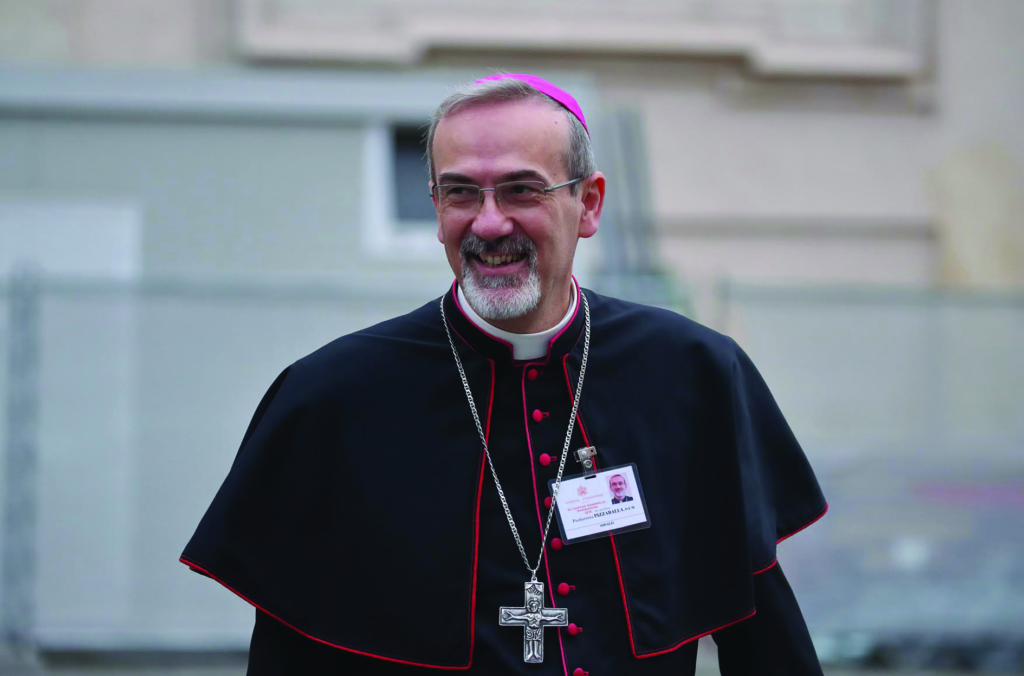Amid increasing attacks on Christians by Israeli extremists, Patriarch Pierbattista Pizzaballa, 57, says, “We have something bigger than hate”
La Croix International

Archbishop Pierbattista Pizzaballa, 57, since November 6, 2020, the Latin Patriarch of Jerusalem. A Franciscan friar, Pizzaballa has a reputation for personal integrity and simplicity; much of his pastoral work has been with Hebrew speakers and he has close ties to Jewish leaders, while he has also been a vocal supporter of the Palestinians Photo Grzegorz Galazka
The Christian faith is bigger than hate crimes and Christians will continue to engage in interreligious dialogue, says the Latin Patriarch of Jerusalem amid increasing attacks by extremists on Church communities in the Holy Land.
“We won’t allow a few deranged criminals to dictate our agenda,” Archbishop Pierbattista Pizzaballa, the Latin Catholic Patriarch of Jerusalem, told Radio Maria in a March interview. “We have something bigger than the hate of these people. Extremists are all the same, but we are not afraid. We know that the general climate is rather negative and we are heading towards an escalation of violence, but we must not be frightened.”
He added: “As a Christian community, we must work and cooperate to build communities of solidarity,” reiterating the need to continue seeking interreligious cooperation, despite increasing attacks on Christians.
Yisca Harani, a researcher in Christian affairs and close to churches, said: “Since the beginning of the year, that is, with the formation of the far-right government in Israel, it is noted that there has been a sharp rise not only in attacks on priests and Christian holy places, but also in the level of violence and audacity in carrying out the attacks. If in the past they spat on a clergyman and hid, today they do so publicly.”
Catholic, Orthodox, and Protestant leaders in Jerusalem have also appealed to authorities in Israel and Palestine to help curb the increasing trend of violence and intimidation that Christians in the Holy Land are facing.
There have been countless incidents of physical and verbal assaults against priests, attacks on Christian churches, with holy sites regularly vandalized and desecrated, and ongoing intimidation of local Christians who simply seek to worship freely and go about their daily lives.
Attacks on Christians
On March 26, a man entered a Maronite church in Nazareth during Mass, forcing the priest to recite the Quran. When the priest refused, the man began to pray aloud until the congregation managed to convince him to leave. On March 23 five masked men with clubs entered a Salesian Sisters School in Nazareth asking the nuns to say “Ramadan Kareem” (Ramadan be generous). The nuns refused and managed to get the men out of the building. A week before that, a Catholic school run by the Franciscan Sisters in Nazareth was fired at by two men. On March 19, clerics were attacked during Sunday service at the Greek Orthodox Church of Gethsemane in Jerusalem by what Church officials described as “Israeli radicals.”
On February 2, the feast of the Presentation of the Lord in the Temple, a man destroyed a statue of Jesus with a hammer at the Church of the Flagellation located on the Via Dolorosa in Jerusalem, the route that Christ walked to Mount Calvary.
Before that, some tourists were attacked by a group of religious Jews who entered the New Gate where they “committed acts of vandalism at the New Gate, near the headquarters of the Custody of the Holy Land, throwing chairs, tables and glasses and transforming the Christian quarter into a battlefield.” And two weeks before that, a Christian cemetery in Jerusalem was vandalized and “Death to Christians” graffiti written on the walls of a monastery in the Armenian quarter and premises used as a church in the Maronite center of Ma’alot.
Pope Francis during the Sunday Angelus on February 26 appealed “to make dialogue prevail over hatred and vengeance,” adding that he prays to God that Palestinians and Israelis “may find the path to fraternity and peace, with the help of the international community.”






Facebook Comments